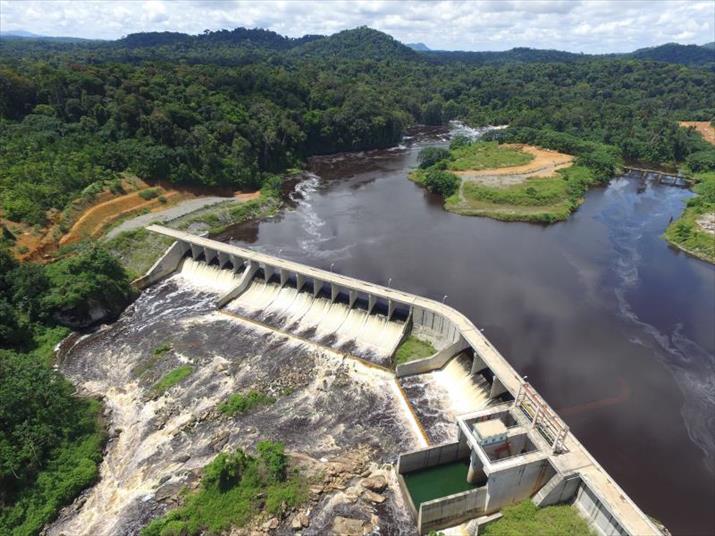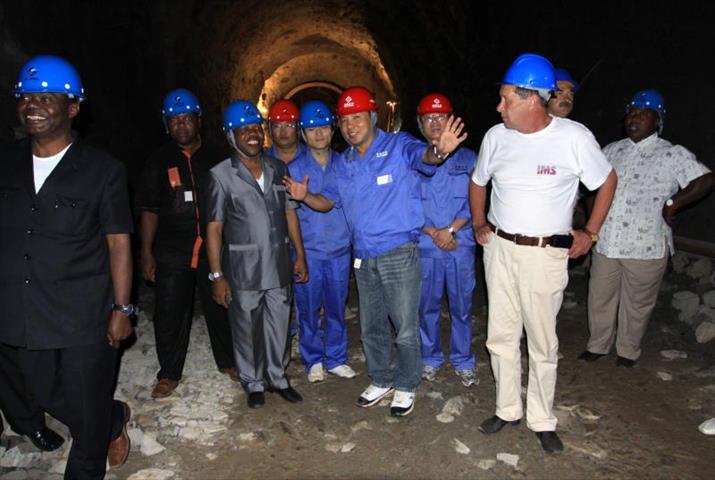|
||||||||||
| Home Nation World Business Opinion Lifestyle ChinAfrica Multimedia Columnists Documents Special Reports |
|
||||||||||
| Home Nation World Business Opinion Lifestyle ChinAfrica Multimedia Columnists Documents Special Reports |
| Africa |
| Power to the People |
| How hydropower forever changes the lifestyle of an Equatorial Guinean village |
| By Cui Xiaoqin ·2017-05-04 |

Liu Bao, General Manager of the Sinohydro Bureau Six Co. Ltd. of the Power Construction Corp. of China and also the Chief Supervisor of the Djiploho Hydropower Station project, said the power plant satisfies more than 90 percent of the country's electricity demand and has promoted the country's industrial and agricultural growth with the help of the Bata grid.
"Who could have imagined that in the desolate primary forest, a group of Chinese friends with a love for Equatorial Guinea are constructing such a grand project?" asked Teodoro Obiang Nguema Mbasogo, President of Equatorial Guinea, at the cornerstone laying ceremony of the power plant in December 2008.
In 2014, the Ministry of Industry and Energy in Equatorial Guinea signed and issued the certificate of transfer of Djiploho Hydropower Station to take over the project. In the process, Equatorial Guinea became one of the first African countries to benefit from the Belt and Road Initiative by having its infrastructure built.
The first hydropower station
Liu still remembers the first time he visited Djiploho Village in June 2007 with his colleagues to investigate local conditions for building the power plant. They were fully equipped, wearing shirts with long sleeves, tight pants and boots and carrying tools such as machetes, axes, spades and saws. The rattans weaved such a thick net between the upper parts of the tall trees standing close to each other that they couldn't see the sky above them. Below, the shrubs and weeds between the trees made it impossible to walk without using machetes to clear a path.
After an investigation of multiple rivers in the Central-West African country, Liu found that Equatorial Guinea is rich not only in oil, but also water resources.
Compared with oil which may become exhausted as a result of excessive exploitation, water has the potential for long-term exploitation and can be used as a clean renewable energy. "To build hydropower plants by making full use of water resources not only satisfies Equatorial Guinea's demand for electricity but also for exporting electricity to other Western African countries," Liu told ChinAfrica, adding that he was fortunate to have met with President Mbasogo, who included his hydropower ideas in the country's 2020 economic development plan.
Liu's team paid special attention to environmental protection during the construction of the power plant.
"We placed great emphasis on environmental protection during our construction and our environmental impact assessment report was passed by local authorities," said Liu. During construction as few trees as possible were cut and all the waste water underwent sedimentation before being discharged. Garbage classification was also practiced, said Liu.
The strict environmental protection measures were welcomed by local government and the local community. The Djiploho Hydropower Station has now become the first hydropower station in Equatorial Guinea to end the country's reliance on oil for power generation, heralding the dawn of green energy.
Social change
The power plant has brought a series of unexpected changes to the country. Although the infrastructure construction of Equatorial Guinea started late, local government is committed to improving education and established a number of schools nationwide. However, limited access to electricity hampered local students' learning progress.
Aware of its social responsibility, since 2007 Liu's company donated $2 million to build several primary schools and a technology school. It has also donated school materials on a regular basis, and thus developed a good relationship with villagers in the area.
However, it is the hydropower plant and the renovation and expansion project of the Bata grid that completely changed local people's lives. The Bata grid project enabled electricity generated by the Djiploho Hydropower Station to be transmitted to urban and rural areas of Equatorial Guinea, which has helped transform the way of teaching in local schools.
Local children are now able to have access to light, watch films and local TV programs. They learned about Chinese kungfu, martial art master Bruce Lee and China's Three Gorges Dam through films.

Several senior villagers have retained the construction tools and equipment given to them by Chinese workers who helped build the first small hydropower station in Bata City in the 1970s. They recounted former Chinese leaders Mao Zedong and Zhou Enlai's friendship with Equatorial Guinea and the improvement of their livelihoods brought by the hydropower plant.
Another area of improvement has been in the agricultural sector.
"Agriculture is underdeveloped in Equatorial Guinea because the country mainly consists of mountainous areas which are unsuitable for the growth of crops," Liu said.
In order to promote local economic growth, he invited Chinese agricultural experts to help Equatorial Guinea plan its husbandry development with the help of the Chinese Embassy in the country. A production chain of meat, eggs and milk was formed by developing the dairy and poultry industries. Liu also suggested producing canned food and industrial starch by taking advantage of the abundant output of pineapples and cassava in the country.
Technological training
To reduce the reliance of locals on foreign expertise, Liu has been a big advocate of promoting technology transfer and strengthening technological training. Given that there was no training school for electric power technology in Equatorial Guinea, Liu applied for $1.26 million from the Power Construction Corp. of China to build the country's first technology training school for the study of electricity.
In addition he has looked ahead and established a joint training program between China and Equatorial Guinea for hydropower plant operation and management staff. Under the program, the Power Construction Corp. of China donated more than $1.5 million to fund 53 youth from Equatorial Guinea to have two to five years' training on hydropower plant management in universities and training centers in China. In May 2013, the first batch of 35 students graduated and began working, which greatly improved Equatorial Guinea's self-management of its industries.
"We focused on promoting the localized management of the hydropower project and hired local people to take part in the construction," said Liu. By participating in the construction, local employees mastered various technical skills such as equipment operation, electrical engineering, welding, drilling, concrete pouring, and steel bar making and installation. The project created jobs for locals and thus improved their lives.
With his ardent interest in youth development, since 2009, Liu has been busy recruiting local university students to participate in project management and construction of the project in every summer vacation. In addition to salaries, students who excel are assisted with their tuition fees.
For his dedication, Liu has received the country's highest civilian honor and has become a celebrated figure among his current and former employees.
| About Us | Contact Us | Advertise with Us | Subscribe |
| Copyright Beijing Review All rights reserved 京ICP备08005356号-5 京公网安备110102005860号 |